- Home
- Hilary Mantel
The Assassination of Margaret Thatcher Page 9
The Assassination of Margaret Thatcher Read online
Page 9
* * *
IN THE EARLY autumn of that year, three months after my trip east, I was at Waterloo Station, on my way to give a talk at a branch library in Hampshire. I had no opinion, now, of the catering anywhere in England. As I turned from the sandwich counter, balancing a baguette I meant to carry carefully to Alton, a tall young man bumped into me and knocked my purse flying from my hand.
It was a full purse, bulging with change, and the coins went wheeling and flying among the feet of fellow travelers, spinning and scattering over the slippery floor. My luck was in, because the people streaming through from Eurostar began laughing and chasing my small fortune, making it a sport to chase every penny and trap it: perhaps they thought it was converse begging, or some sort of London custom, like Pearly Kings. The young man himself bobbed and weaved among the European feet, and eventually it was he who emptied a handful of change back into my purse, with a wide white smile, and, just for a second, pressed my hand to reassure me. Amazed, I gazed up into his face: he had large blue eyes, a shy yet confident set to him; he was six foot and lightly bronzed, strong but softly polite, his jacket of indigo linen artfully crumpled, his shirt a dazzling white; he was, in all, so clean, so sweet, so golden, that I backed off, afraid he must be American and about to convert me to some cult.
When I arrived at the library, an ambitious number of chairs—fifteen, at first count—were drawn up in a semicircle. Most were filled: a quiet triumph, no? I did my act on autopilot, except that when it came to my influences I went a bit wild and invented a Portuguese writer who I said knocked Pessoa into a cocked hat. The golden young man kept invading my mind, and I thought I’d quite like to go to bed with someone of that ilk, by way of a change. Wasn’t everybody due a change? But he was a different order of being from me: a person on another plane. As the evening wore on, I began to feel chilly, and exposed, as if a wind were whistling through my bones.
* * *
I SAT UP for a while, in a good enough bed in a clean enough room, reading The Right Side of Midnight, making marginal annotations, and wondering why I’d ever thought the public might like it. My cheek burned on a lumpy pillow, and the usual images of failure invaded me; but then, about three o’clock I must have slept.
I woke refreshed, from no dreams: in a cider-apple dawn, a fizz and sharpness in the air. Out of bed, I rejoiced to see that someone had scrubbed the shower. I could bear to step into it, and did. Cold soft water ran over my scalp. My eyes stretched wide open. What was this? A turning point?
I was on the crowded train for eight, my fingers already twitching for my notebook. We had scarcely pulled out of the station when a grinning young steward bounced a laden trolley down the aisle. Seeing his Ginormous Harvest Cookies, his Golden Toastie Crunches in cellophane wrap, the men around me flapped their copies of the Financial Times at him, and began to jab their fingers, chattering excitedly. “Tea?” the steward exclaimed. “My pleasure, sir! Small or large?”
I noticed Large was just Small with more water, but I was swept away, infused by the general bonhomie. I took out my purse, and when I opened it I saw with surprise that the Queen’s heads were tidily stacked, pointing upward. And was there one more head than I’d expected? I frowned. My fingers flicked the edges of the notes. I’d left home with eighty pounds. It seemed I was coming back with a round hundred. I was puzzled (as the steward handed me my Large Tea); but only for a moment. I remembered the young man with his broad white smile and his ashen hair streaked with gold; the basted perfection of his firm flesh, and the grace of his hand clasping mine. I slotted the notes back inside, slid my purse away, and wondered: which of my defects did he notice first?
THE HEART FAILS WITHOUT WARNING
September: When she began to lose weight at first, her sister had said, I don’t mind; the less of her the better, she said. It was only when Morna grew hair—fine down on her face, in the hollow curve of her back—that Lola began to complain. I draw the line at hair, she said. This is a girls’ bedroom, not a dog kennel.
Lola’s grievance was this: Morna was born before she was, already she had used up three years’ worth of air, and taken space in the world that Lola could have occupied. She believed she was birthed into her sister’s squalling, her incessant I-want I-want, her give-me give-me.
Now Morna was shrinking, as if her sister had put a spell on her to vanish. She said, if Morna hadn’t always been so greedy before, she wouldn’t be like this now. She wanted everything.
Their mother said, “You don’t know anything about it, Lola. Morna was not greedy. She was always picky about her food.”
“Picky?” Lola made a face. If Morna didn’t like something she would make her feelings known by vomiting it up in a weak acid dribble.
It’s because of the school catchment area they have to live in a too-small house and share a bedroom. “It’s bunk beds or GCSEs!” their mother said. She stopped, confused by herself. Often what she said meant something else entirely, but they were used to it; early menopause, Morna said. “You know what I mean,” she urged them. “We live in this house for the sake of your futures. It’s a sacrifice now for all of us, but it will pay off. There’s no point in getting up every morning in a lovely room of your own and going to a sink school where girls get raped in the toilets.”
“Does that happen?” Lola said. “I didn’t know that happened.”
“She exaggerates,” their father said. He seldom said anything, so it made Lola jump, him speaking like that.
“But you know what I’m saying,” her mother said. “I see them dragging home at two in the afternoon, they can’t keep them in school. They’ve got piercings. There’s drugs. There’s internet bullying.”
“We have that at our school,” Lola said.
“It’s everywhere,” their father said. “Which is another reason to keep off the internet. Lola, are you listening to what I’m telling you?”
The sisters were no longer allowed a computer in their room because of the sites Morna liked to look at. They had pictures of girls with their arms stretched wide over their heads in a posture of crucifixion. Their ribs were spaced wide apart like the bars of oven shelves. These sites advised Morna how to be hungry, how not to be gross. Any food like bread, butter, an egg, is gross. A green apple or a green leaf, you may have one a day. The apple must be poison green. The leaf must be bitter.
“To me it is simple,” their father said. “Calories in, calories out. All she has to do is open her mouth and put the food in, then swallow. Don’t tell me she can’t. It’s a question of won’t.”
Lola picked up an eggy spoon from the draining board. She held it under her father’s nose as if it were a microphone. “Yes, and have you anything you want to add to that?”
He said, “You’ll never get a boyfriend if you look like a needle.” When Morna said she didn’t want a boyfriend, he shouted, “Tell me that again when you’re seventeen.”
I never will be, Morna said. Seventeen.
* * *
SEPTEMBER: LOLA ASKED for the carpet to be replaced in their room. “Maybe we could have a wood floor? Easier to clean up after her?”
Their mother said, “Don’t be silly. She’s sick in the loo. Isn’t she? Mostly? Though not,” she said hurriedly, “like she used to be.” It’s what they had to believe: that Morna was getting better. In the night, you could hear them telling each other, droning on behind their closed bedroom door; Lola lay awake listening.
Lola said, “If I can’t have a new carpet, if I can’t have a wood floor, what can I have? Can I have a dog?”
“You are so selfish, Lola,” their mother shouted. “How can we take on a pet at a time like this?”
Morna said, “If I die, I want a woodland burial. You can plant a tree and when it grows you can visit it.”
“Yeah. Right. I’ll bring my dog,” Lola said.
* * *
SEPTEMBER: LOLA SAID, “The only thing is, now she’s gone so small I can’t steal her clothes. This was my ma
in way of annoying her and now I have to find another.”
All year round Morna wore wool to protect her shoulders, elbows, hips, from the blows of the furniture, and also to look respectably fat so that people didn’t point her out on the street; also, because even in July she was cold. But the winter came early for her, and though the sun shone outside she was getting into her underlayers. When she stepped on the scale for scrutiny she appeared to be wearing normal clothes, but actually she had provided herself with extra weight. She would wear one pair of tights over another; every gram counts, she told Lola. She had to be weighed every day. Their mother did it. She would try surprising Morna with spot checks, but Morna would always know when she was getting into a weighing mood.
Lola watched as their mother pulled at her sister’s cardigan, trying to get it off her before she stepped onto the scales. They tussled like two little kids in a playground; Lola screamed with laughter. Their mother hauled at the sleeve and Morna shouted, “Ow, ow!” as if it were her skin being stretched. Her skin was loose, Lola saw. Like last year’s school uniform, it was too big for her. It didn’t matter, because the school had made it clear they didn’t want to see her this term. Not until she’s turned the corner, they said, on her way back to a normal weight. Because the school has such a competitive ethos. And it could lead to mass fatalities if the girls decided to compete with Morna.
When the weighing was over, Morna would come into their bedroom and start peeling off her layers, while Lola watched her, crouched on her bottom bunk. Morna would stand sideways to the mirror with her ribs arched. You can count them, she said. After the weighing she needed reassurance. Their mother bought them the long mirror because she thought Morna would be ashamed when she saw herself. The opposite was true.
* * *
OCTOBER: IN THE morning paper there was a picture of a skeleton. “Oh look,” Lola said, “a relative of yours.” She pushed it across the breakfast table to where Morna sat poking a Shredded Wheat with her spoon, urging it toward disintegration. “Look, Mum! They’ve dug up an original woman.”
“Where?” Morna said. Lola read aloud, her mouth full. “Ardi stands four feet high. She’s called Ardipithecus. Ardi for short. For short!” She spluttered at her own joke, and orange juice came down her nose. “They’ve newly discovered her. ‘Her brain was the size of a chimpanzee’s.’ That’s like you, Morna. ‘Ardi weighed about fifty kilograms.’ I expect that was when she was wearing all her animal skins, not when she was just in her bones.”
“Shut it, Lola,” their father said. But then he got up and walked out, breakfast abandoned, his mobile phone in his hand. His dirty knife, dropped askew on his plate, swung across the disk like the needle of a compass, and rattled to its rest. Always he was no more than a shadow in their lives. He worked all the hours, he said, to keep the small house going, worrying about the mortgage and the car while all she worried about was her bloody waistline.
Lola looked after him, then returned to the original woman. “Her teeth show her diet was figs. ‘She also ate leaves and small mammals.’ Yuck, can you believe that?”
“Lola, eat your toast,” their mother said.
“They found her in bits and pieces. First just a tooth. ‘Fossil hunters first glimpsed this species in 1992.’ That’s just before we first glimpsed Morna.”
“Who found her?” Morna said.
“Lots of people. I told you, they found her in bits. ‘Fifteen years’ work involving forty-seven researchers.’”
Looking at Morna, their mother said, “You were fifteen years’ work. Nearly. And there was only me to do it.”
“‘She was capable of walking upright,’” Lola read. “So are you, Morna. Till your bones crumble. You’ll look like an old lady.” She stuffed her toast into her mouth. “But not four million years old.”
* * *
NOVEMBER: ONE MORNING their mother caught Morna knocking back a jug of water before the weigh-in. She shouted, “It can swell your brain! It can kill you!” She knocked the jug out of her daughter’s hand and it shattered all over the bathroom floor.
She said, “Oh, seven years’ bad luck. No, wait. That’s mirrors.”
Morna wiped the back of her hand across her mouth. You could see the bones in it. She was like a piece of science course work, Lola said thoughtfully. Soon she’d have no personhood left. She’d be reduced to biology.
The whole household, for months now, a year, had been enmeshed in mutual deception. Their mother would make Morna a scrambled egg and slide a spoonful of double cream into it. The unit where Morna was an inpatient used to make her eat white-bread sandwiches thickly buttered and layered with rubber wedges of yellow cheese. She used to sit before them, hour after hour, compressing the bread under her hand to try to squeeze out the oily fat onto the plate. They would say, try a little, Morna. She would say, I’d rather die.
If her weight fell by a certain percentage she would have to go back to the unit. At the unit they stood over her until she ate. Meals were timed and had to be completed by the clock or there were penalties. The staff would watch her to make sure she was not slipping any food into the layers of her clothes, and layers in fact were monitored. There was a camera in every bathroom, or so Morna said. They would see her if she made herself sick. Then they would put her to bed. She lay so many days in bed that when she came home her legs were wasted and white.
The founder of the unit, a Scottish doctor with a burning ideal, had given the girls garden plots and required them to grow their own vegetables. Once she had seen a starving girl eat some young peas, pod and all. The sight had moved her, the sight of the girl stretching her cracked lips and superimposing the green, tender smile: biting down. If they only saw, she said, the good food come out of God’s good earth.
But sometimes the girls were too weak for weeding and pitched forward into their plots. And they were picked up, brushing crumbs of soil away; the rakes and hoes lay abandoned on the ground, like weapons left on a battlefield after the defeat of an army.
* * *
NOVEMBER: THEIR MOTHER was grumbling because the supermarket van had not come with the order. “They say delivery in a two-hour time slot to suit you.” She pulled open the freezer and rummaged. “I need parsley and yellow haddock for the fish pie.”
Lola said, “It will look as if Morna’s sicked it already.”
Their mother yelled, “You heartless little bitch.” Iced vapor billowed around her. “It’s you who brings the unhappiness into this house.”
Lola said, “Oh, is it?”
Last night Lola had seen Morna slide down from her bunk, a wavering column in the cold; the central heating was in its off phase, since no warm-blooded human being should be walking about at such an hour. She pushed back her quilt, stood up and followed Morna onto the dark landing. They were both barefoot. Morna wore a ruffled nightshirt, like a wraith in a story by Edgar Allan Poe. Lola wore her old Mr. Men pajamas, ages 8–9, to which she was attached beyond the power of reason. Mr. Lazy, almost washed away, was a faded smudge on the shrunken top, which rose and gaped over her round little belly; the pajama legs came halfway down her calves, and the elastic had gone at the waist, so she had to hitch herself together every few steps. There was a half moon and on the landing she saw her sister’s face, bleached out, shadowed like the moon, cratered like the moon, mysterious and far away. Morna was on her way downstairs to the computer to cancel the supermarket order.
In their father’s office Morna had sat down on his desk chair. She scuffed her bare heels on the carpet to wheel it up to the desk. The computer was for their father’s work use. They had been warned of this and told their mother got ten GCSEs without the need of anything but a pen and paper; that they may use the computer under strict supervision; that they may also go online at the public library.
Morna got up the food order onscreen. She mouthed at her sister, “Don’t tell her.”
She’d find out soon enough. The food would come anyway. It always did. Morna di
dn’t seem able to learn that. She said to Lola, “How can you bear to be so fat? You’re only eleven.”
Lola watched her as she sat with her face intent, patiently fishing for the forbidden sites, swaying backward and forward, rocking on the wheeled chair. She turned to go back to bed, grabbing her waist to stop her pajama bottoms from falling down. She heard a sound from her sister, a sound of something, she didn’t know what. She turned back. “Morna? What’s that?”
For a minute they didn’t know what it was they were seeing on the screen: human or animal? They saw that it was a human, female. She was on all fours. She was naked. Around her neck there was a metal collar. Attached to it was a chain.
Lola stood, her mouth ajar, holding up her pajamas with both hands. A man was standing out of sight holding the chain. His shadow was on the wall. The woman looked like a whippet. Her body was stark white. Her face was blurred and wore no readable human expression. You couldn’t recognize her. She might be someone you knew.
“Play it,” Lola said. “Go on.”
Morna’s finger hesitated. “Working! He’s always in here, working.” She glanced at her sister. “Stick with Mr. Lazy, you’ll be safer with him.”
“Go on,” Lola said. “Let’s see.”
But Morna erased the image. The screen was momentarily dark. One hand rubbed itself across her ribs, where her heart was. The other hovered over the keyboard; she retrieved the food order. She ran her eyes over it and added own-brand dog food. “I’ll get the blame,” Lola said. “For my fantasy pet.” Morna shrugged.
Later they lay on their backs and murmured into the dark, the way they used to do when they were little. Morna said he would claim he found it by accident. That could be the truth, Lola said, but Morna was quiet. Lola wondered if their mother knew. She said, you can get the police coming round. What if they come and arrest him? If he has to go to prison we won’t have any money.

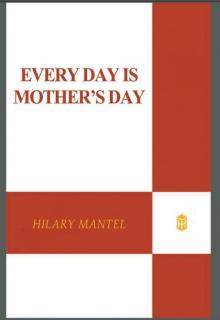 Every Day Is Mother's Day
Every Day Is Mother's Day An Experiment in Love
An Experiment in Love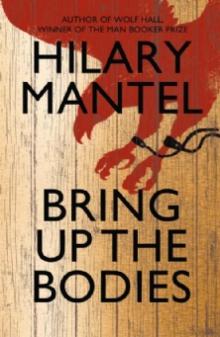 Wolf Hall
Wolf Hall A Place of Greater Safety
A Place of Greater Safety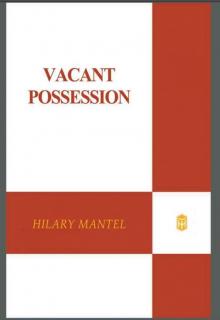 Vacant Possession
Vacant Possession The Giant, O'Brien
The Giant, O'Brien Beyond Black
Beyond Black Ink in the Blood: A Hospital Diary
Ink in the Blood: A Hospital Diary The School of English
The School of English Giving Up the Ghost
Giving Up the Ghost The Mirror and the Light: 2020’s highly anticipated conclusion to the best selling, award winning Wolf Hall series (The Wolf Hall Trilogy, Book 3)
The Mirror and the Light: 2020’s highly anticipated conclusion to the best selling, award winning Wolf Hall series (The Wolf Hall Trilogy, Book 3) Fludd
Fludd Eight Months on Ghazzah Street
Eight Months on Ghazzah Street Learning to Talk
Learning to Talk How Shall I Know You?: A Short Story
How Shall I Know You?: A Short Story A Change of Climate
A Change of Climate Bring Up the Bodies
Bring Up the Bodies The Assassination of Margaret Thatcher: Stories
The Assassination of Margaret Thatcher: Stories Beyond Black: A Novel
Beyond Black: A Novel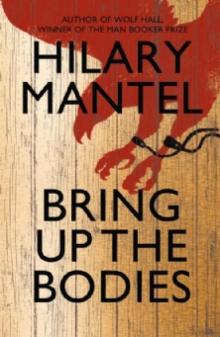 Wolf Hall: Bring Up the Bodies
Wolf Hall: Bring Up the Bodies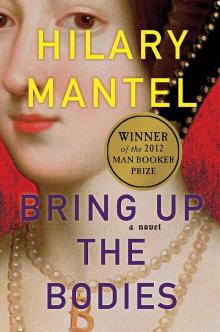 Bring Up the Bodies tct-2
Bring Up the Bodies tct-2 Ink in the Blood
Ink in the Blood The Assassination of Margaret Thatcher
The Assassination of Margaret Thatcher Eight Months on Ghazzah Street: A Novel
Eight Months on Ghazzah Street: A Novel How Shall I Know You?
How Shall I Know You? A Change of Climate: A Novel
A Change of Climate: A Novel The Giant, O'Brien: A Novel
The Giant, O'Brien: A Novel Fludd: A Novel
Fludd: A Novel A Place of Greater Safety: A Novel
A Place of Greater Safety: A Novel An Experiment in Love: A Novel
An Experiment in Love: A Novel